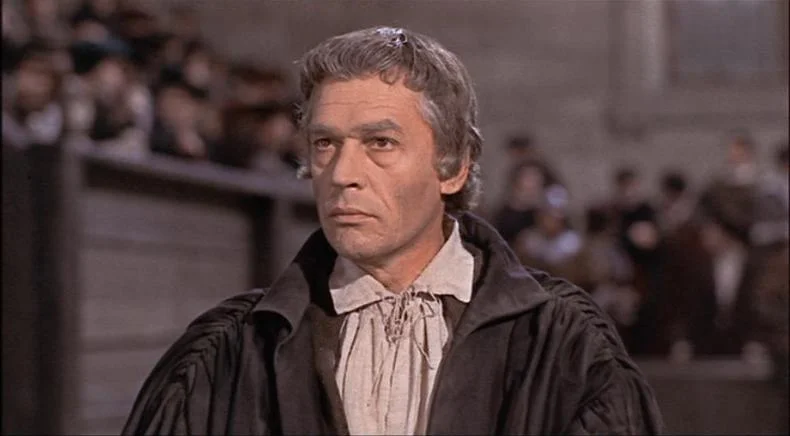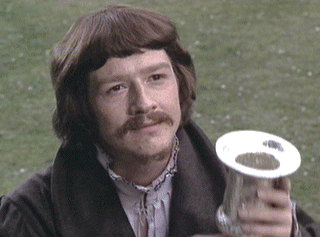And he said to all, "If any man would come after me, let him deny himself and take up his cross daily and follow me. For whoever would save his life will lose it; and whoever loses his life for my sake, he will save it. For what profit is there for one to gain the whole world yet lose himself? For whoever is ashamed of me and of my words, of him will the Son of man be ashamed when he comes in his glory and the glory of the Father and of the holy angels. (Luke 9:23–26)
Just about every year I teach the play and film "A Man for All Seasons" in one of my college theology courses. It is, of course, a play that focuses on the issue of conscience (though not in the way that it is usually critiqued for doing so*). In the end, the two characters who fully oppose each other are Richard Rich and Sir Thomas More. What stands between them is not so much an issue of law or a matter of opinion, but a relationship to the truth. Richard perjures himself to gain what he wants, while Thomas accepts the consequences of another's perjury rather than speak words himself that are not true. We know that the consequence for Thomas is death by beheading, while the last line of the film (not the play) tells us the consequence for the perjurer who sealed his fate: "Richard Rich became Chancellor of England and died in his bed."
Thomas lost his life immediately, while Richard held on to his life to receive everything he could have wanted.
A recent practice I have taken up with my eldest son is to read five psalms together on Sundays. On our third such Sunday, we were reading Psalms 11–15. After I read him the 15th psalm aloud, my son Caleb looked back up at the end of the 4th verse to read "who stands by his oath even to his hurt." And he said, "that's like Thomas More." He's right. Back at the beginning of that psalm we hear what kind of person is being described: "He who lives without blame, who does what is right, and in his heart acknowledges the truth" (v. 2). Thomas died--without blame--because he did not say with his words what he knew to be false in his heart, where the Gospel of Christ lived (see his closing court testimony**).
We then looked back upon Psalm 14, which we had read just a couple minutes earlier. This psalm begins "The fool (or the benighted man) says in his heart, 'God does not care'" (v. 1). "So I guess that's Richie Rich," I suggested to Caleb. He agreed. What was in Rich's heart? At the critical moments when his character was determined, his heart was filled with his concern for his own position, his own status, his own prospects for success. He knew the truth and yet he exercised a rather casual relationship to it. The truth could be of use to him on occasion, misrepresented by him as necessary, or even denied outright depending on the circumstances. Rich lived long and received plentiful reward for his conduct, and when he died his natural death he died clinging to what he loved most: himself, or rather, his obsessive self-regard. But the dead man loses all he holds and the only one whom Rich had allowed to have a claim on him was himself. And so he loses himself.
Robert Bolt, who wrote "A Man for All Seasons", described Rich in the preface to his work: "There is a special kind of shrug to a perjurer," he wrote; "we feel that the man has no self to commit, no guarantee to offer... We feel – we know – the self to be an equivocal commodity." In other words, the one who makes himself – his own word, his relationship to the truth – into something with commercial value, which can be traded away or bartered for some prize, some role, some honor - or even the whole lot of them, unto the whole world - loses everything. In trading away himself, he becomes no one. And that is the only humiliation, in the end.
When Jesus says that of this man he himself will "be ashamed when he comes glory," I take him to mean that filling your heart with lies and deception so as to trade yourself away for any profit whatsoever - whether Wales or all of England or the whole world - will reduce you to nothing in the end, and glory of the Lord will pass right through you. There will be nothing there for his glory to light up. But the one who in his heart of hearts "acknowledges the truth" (15:2), will be a person of flesh and blood whom Son of man makes to shine like the sun.
Prayer: O Lord, cure my heart of its wanderlust and keep it at home in your truth.
* For more, see that fifth chapter of my What Matters Most where I present a reading of the play that responds to typical critiques of the deficiency relative to the presentation of conscience.
** This is also in the section of the fifth chapter of my What Matters Most.


